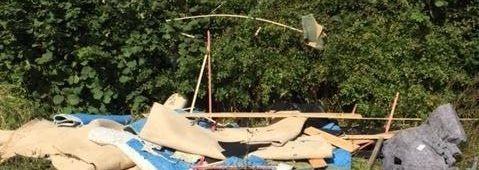This website uses cookies so that we can provide you with the best user experience possible. Cookie information is stored in your browser and performs functions such as recognising you when you return to our website and helping our team to understand which sections of the website you find most interesting and useful.

Fly tipping has long been a menace for owners of rural land and is now increasingly so for commercial property owners in urban areas.
Most people will be familiar with the sight of illegally dumped waste on either their own land, public highways or open spaces and many are becoming victims of this indiscriminate environmental crime that is a blight in the places we live, work and spend our free time.
Fly tipping is defined as the illegal disposal of household, industrial, commercial or other controlled waste without a Waste Management Licence.
Waste can be liquid or solid and controlled waste can include anything from garden refuse, toxic or hazardous industrial waste and the all too familiar fridges, ovens carpets and mattresses.
It is a criminal offence under Section 33 of the Environmental Protection Act 1990 for a person to deposit controlled waste unless they have the appropriate Waste Management Licence authorising the collection, transporting and depositing of such waste. The impact of fly tipping is clear to see, it is a blight on local environments, a source of pollution, a potential danger to public health and a hazard to wildlife.
Fly tipping also damages the reputation of legitimate waste businesses where unlawful activities are carried out by criminals seeking to make an easy profit.
The National Fly Tipping Prevention group sights a number of likely causes for the increasing number of fly tipping incidents. These include, for example:
-
the lack of authorised waste disposal facilities or access to them;
-
a general attitude of laziness in some sections of society believing that somebody else will always clear up after them; or
-
for pure financial gain through criminal activity.
The increase in the instances of fly tipping also appears to be as a result of the increased amounts of building works being carried out in a thriving economy, from small scale domestic alterations to large scale commercial developments.
Who bears responsibility for the clear-up?
The Environment Agency (EA) and Local Authorities have developed a scheme whereby the EA agrees to deal with large incidents involving hazardous waste, whereas LA’s remain responsible for the clearance of low level incidents. The problem arises for private property owners when waste is illegally dumped on their land. The landowner, in such instances, assumes all responsibility regarding the waste being cleared away and if they do not do so voluntarily, LA’s have the power to compel land owners to undertake clean up works. The removal of such waste is not only time consuming, but can be expensive and hazardous to individuals who are not familiar, or trained, in waste management techniques.
So what can be done?
Landowners can take some steps to reduce the risk of becoming victims of illegal fly tipping by:
-
upgrading security / access to land and property;
-
arranging for the removal of fly tipped waste as soon as possible (after any investigation has been carried out) to ensure the site does not become a particular hotspot for tipping;
-
install CCTV to assist in the identification and apprehension of offenders; and
-
be ready to share information relating to suspicious activity that may give rise to fly tipping.
We can all play our part by ensuring that the business we deal with only ever use reputable and authorised methods of waste disposal.
For practical advice and any further legal guidance in respect of any issues relating to fly tipping or environmental protection matters generally please contact Jamie Brown for further details.
Share this post:
